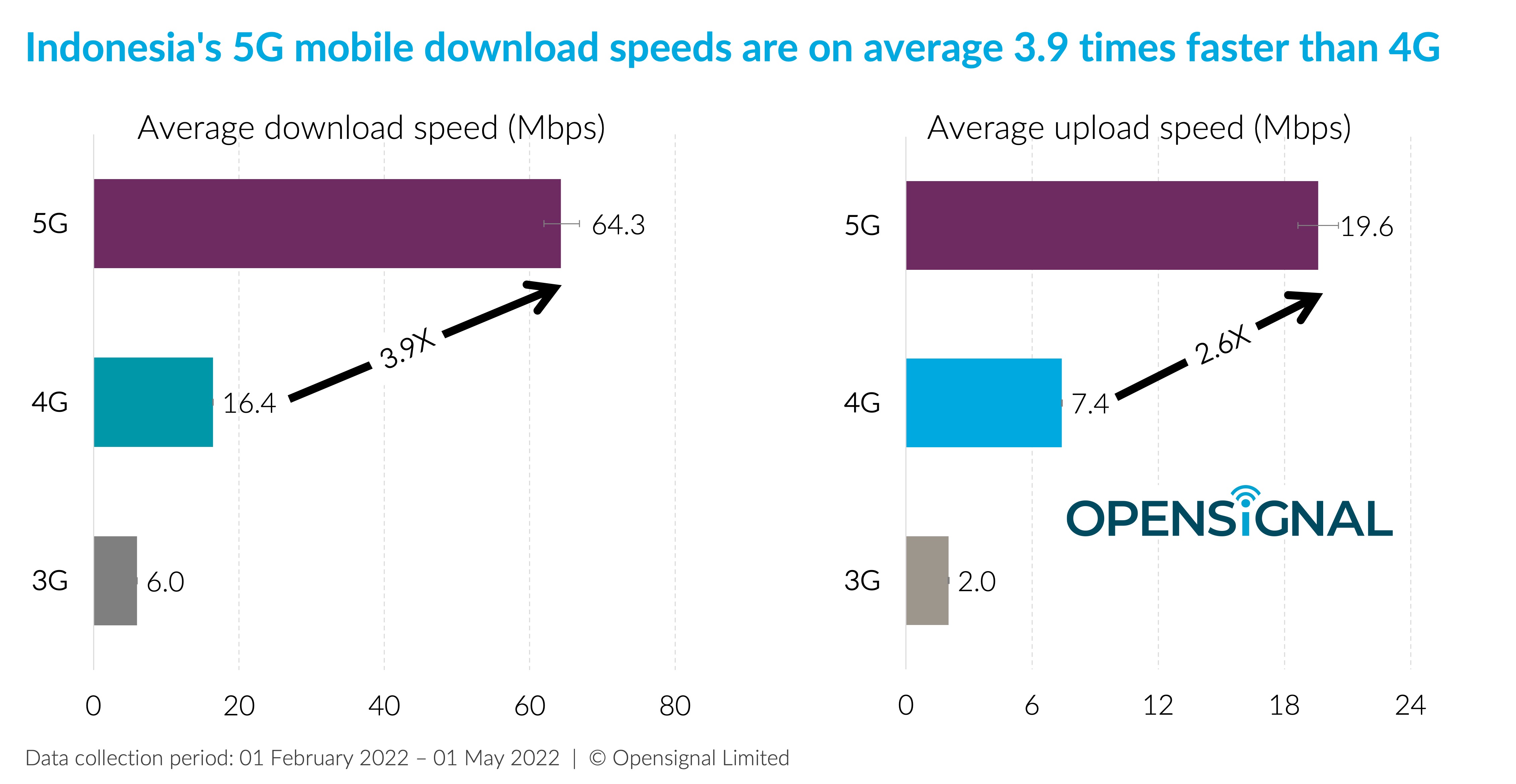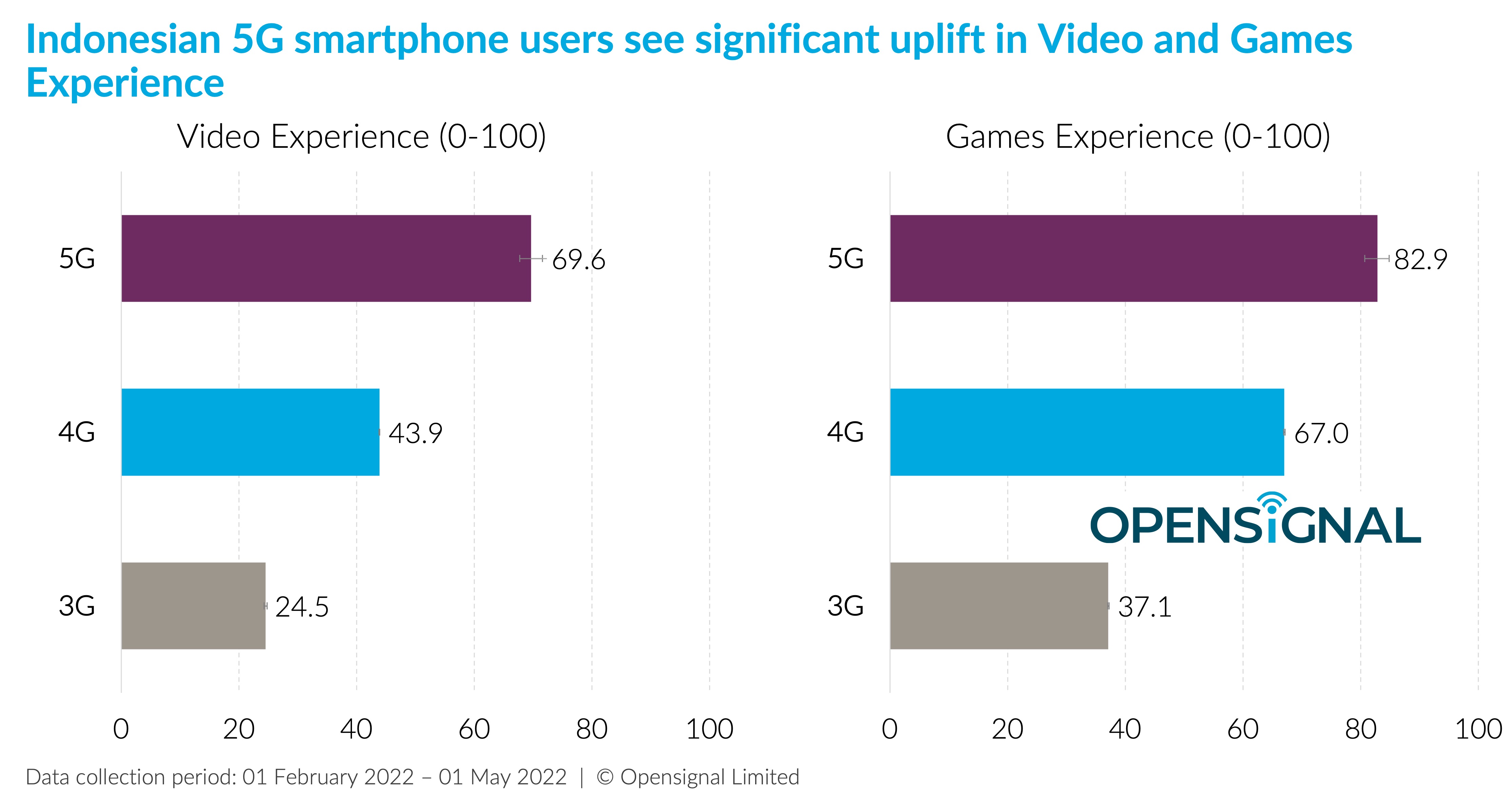Indonesia launched 5G just over a year ago. While Telkomsel was the first operator to have rolled out commercial 5G services in limited areas of the country, followed by Indosat and XL, other national operators — 3 and Smartfren — are still preparing their networks to adopt the new technology. And since then, Indonesia's 5G operators have continued expanding their 5G services to other parts of the country. But how does the 5G mobile experience fare in Indonesia? And how does it compare to 4G and 3G?
Opensignal’s data shows that although Indonesia's 5G services are still at an early stage, 5G already delivers a significant uplift in mobile experience compared to older 4G and 3G technologies. In this analysis, we've examined the real-world mobile experience of our smartphone users in Indonesia on 3G, 4G, and 5G networks, and compared them against each other in terms of their average download and upload speeds, and their experience when streaming video and playing multiplayer mobile games.

The download speed of Indonesian users averaged a noteworthy 64.3 Mbps when connected on 5G, which is 3.9 times faster than on 4G and 10.8 times faster than 3G. However, the difference between average 3G and 4G was smaller, with users’ 4G download speeds averaging 16.4 Mbps — 2.8 times faster than 3G speeds.
There is a similar improvement in users’ mobile upload speeds with 5G. Indonesian smartphone users experienced average upload speeds of 19.6 Mbps when connected to 5G — 2.6 times faster than the 7.4 Mbps when connected to 4G. The gap between 3G and 4G is even higher. The average 4G upload speeds of our users are 3.6 times faster than their speeds when connected to 3G.
While download speed often receives more attention, upload speed is becoming an increasingly important aspect of the mobile network experience due to changing usage patterns and consumption habits. Upload speed affects how quickly and conveniently mobile users can share large files, such as photos or videos, via social media services or as email attachments on the go.
Further, with smartphones being the primary screen and wireless internet the preferred mode to access content online, Indonesia's video streaming on both global and local platforms has been expanding across the country. This means Indonesian operators are in the prime position to provide consumers with quality video streaming services.
Looking at the experience of our smartphone users when streaming video over mobile connections, we found that users enjoyed a Very Good (65-75) Video Experience when connected to 5G, instead of the Fair (40-55) Video Experience seen when connected to 4G. In contrast, with 3G they had a Poor (under 40) Video Experience.

Our analysis looks at the real-world video experience across a range of content delivery networks, using dedicated video streaming tests, to reflect the true experience of users. And these results show that our Indonesian users enjoyed the best Video Experience on 5G.
A Very Good rating is the second-highest rating for Video Experience. As we descend down the ratings, loading times get longer and our users encounter more stops and stutters in the video stream. In terms of scores, the 5G Video Experience reported by our users was 25.8 points greater than the 4G Video Experience. Whereas the Video Experience on 4G was 19.3 points higher than that seen on 3G.
Indonesia is one of Southeast Asia's largest mobile games markets — both by players and by revenue. And with the rising popularity of Esports among the largely young population, Indonesians are playing multiplayer mobile games online more than ever. This means multiplayer games are an increasingly important part of the mobile experience.
Opensignal's analysis of mobile multiplayer gaming shows that Indonesian smartphone users saw a Good (75-85) Games Experience when connected to 5G, a Fair (65-75) Games Experience when connected to 4G, which worsens down to Very Poor (under 40) when connected to 3G. The score on 5G was 15.8 points higher than 4G. Meanwhile, the difference between 3G and 4G Games Experience was stark, with scores separated by almost 30 points.
Opensignal's Games Experience measures how mobile users experience real-time multiplayer mobile gaming on an operator's network. Measured on a 100-point scale, it analyzes how the multiplayer mobile Games Experience is affected by mobile network conditions, including latency, packet loss and jitter, to determine the impact on multiplayer gameplay.
A Good Games Experience indicates most users deemed the experience acceptable. The gameplay experience was generally controllable, and the user received immediate feedback between their actions and the outcomes in the game. Most users did not experience a delay between their actions and the game. In contrast, a Very Poor rating means nearly all users found this level of experience unacceptable.
These findings prove that 5G delivers a significantly improved mobile network experience in Indonesia compared to older and mature 4G or 3G services for download and upload speeds, video streaming, and multiplayer gaming. However, these improvements are just a start as Indonesia's 5G is still near the beginning of its era. Currently, the regulator KOMINFO is aiming to achieve equitable deployment of 5G networks in the country by 2025, faster than the time taken for 4G. Over the years Indonesia has seen big improvements in 4G technology, and as it progresses with 5G, Opensignal will continue to monitor how the real-world 5G experience is evolving in the country.
Opensignal Limited retains ownership of this insight including all intellectual property rights, data, content, graphs & analysis. Reports and insights produced by Opensignal Limited may not be quoted, reproduced, distributed, published for any commercial purpose (including use in advertisements or other promotional content) without prior written consent. Journalists are encouraged to quote information included in Opensignal reports and insights provided they include clear source attribution. For more information, contact [email protected].
